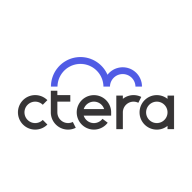

CTERA Enterprise File Services Platform and Cohesity Data Cloud are competing solutions in file management and data protection. Cohesity appears to have the upper hand due to its advanced data recovery and scalability, which users find worth the investment despite CTERA's advantages in pricing and support.
Features: CTERA provides seamless integration with existing IT infrastructures, secure collaboration with encrypted file sharing, and flexible storage options. Cohesity offers advanced data backup, unified cloud integrations, and comprehensive disaster recovery, emphasizing scalability.
Room for Improvement: CTERA could enhance its scalability and expand advanced recovery features. Improvements in user interface and additional integration capabilities would be beneficial. Cohesity might address concerns over its complex feature set, optimizing pricing structure, and ensuring more streamlined integration processes.
Ease of Deployment and Customer Service: CTERA supports cloud-based, hybrid, and on-prem deployments with clear documentation, appealing to security-conscious buyers. Cohesity provides simple setup and robust technical support, praised for responsiveness and benefiting those prioritizing quick deployment.
Pricing and ROI: CTERA is cost-effective with lower initial investment, attractive to businesses focused on security. Cohesity's higher setup cost is offset by strong ROI due to extensive features and scalability, which justifies the investment for organizations aiming for long-term data management solutions.
If I find myself stuck in a cyber recovery situation, this tool can help me avoid spending my money on ransom payments.
Adding SSD storage to Windows file servers is expensive, and we no longer need to back up those devices.
I am positive that CTERA has helped reduce the total cost of ownership by eliminating the need for manual storage management and reducing storage service processes.
issues with Cohesity Data Cloud have not been encountered, suggesting a robust service.
Sometimes I face delays, which can be frustrating.
They swiftly address concerns and take ownership of the call, providing a very satisfactory support experience.
High-priority issues are handled promptly.
I would rate their support a ten out of ten.
If we need to upgrade CPU and memory, we should be able to do that without a license upgrade.
CTERA is a very scalable product, allowing us to grow.
It offers good scalability options, including vertical and outward scalability.
It has been pretty stable since then.
We had things deployed for years, and we were suddenly getting cloud sync issues that were crashing our sites.
It is very stable and reliable.
The primary drawback is the need to transfer large amounts of data to the cloud via an internet connection, requiring significant bandwidth.
The pricing of the Cloud is on the higher side, and it should be cost-effective enough to compete with native solutions.
AI and automation features could enhance the platform, such as AI-powered search, predictive storage analytics, and intelligent alerts for proactive monitoring.
It would help to have a global single-pane-of-glass view of all my CTERA devices.
One suggested improvement for the CTERA Enterprise File Services Platform is the ability to distribute data across multiple active backend storage nodes rather than the current limitation of a single active node.
Cohesity Data Cloud is more costly in the long term compared to physical tapes.
There is an additional cost for infrastructure, which I need to provide.
Unlike other solutions that require hardware purchases, CTERA offers software licensing with flexibility across multiple infrastructure providers.
CTERA's pricing seems to be on par with some of the other players, such as Nasuni and Azure.
I find the pricing reasonable.
It replicates data to the cloud in a tamper-proof manner, offering protection against ransomware attacks since it is not under administrative control.
They have a feature called DataSock, which enhances data protection.
As soon as something is written to the device, CTERA copies it to the cloud, where it's versioned with snapshots so we can recover it.
A vital advantage of this platform is its instantaneous recovery capability, allowing seamless access to a secondary gateway if the primary one fails.
It is a three-in-one solution for us. It is a file-sharing platform, an archiving solution, and also a backup solution.


Consolidate your backups, file shares, object stores and data for dev/test and analytics on a web-scale data management platform.
The CTERA Enterprise File Services Platform provides a cloud-native global file system over public and private object storage, revolutionizing the world of hybrid cloud data solutions. Enhanced by a rich data services ecosystem, CTERA enables enterprises to gain full control of their data for optimal edge performance, data insight, and governance. The platform focuses on security, providing features like data encryption, access controls, and ransomware protection. Centralized management tools enable efficient data control and monitoring. The platform is being used to replace legacy NAS and file servers, especially at remote locations, and simplify backup and disaster recovery of file data while providing the flexibility of multi-cloud deployments with infinite scalability. CTERA is at the core of hybrid cloud transformations of some of the world’s largest banks, healthcare organizations, global media groups, and government agencies, in deployments that scale to tens of petabytes.
We monitor all Cloud Backup reviews to prevent fraudulent reviews and keep review quality high. We do not post reviews by company employees or direct competitors. We validate each review for authenticity via cross-reference with LinkedIn, and personal follow-up with the reviewer when necessary.